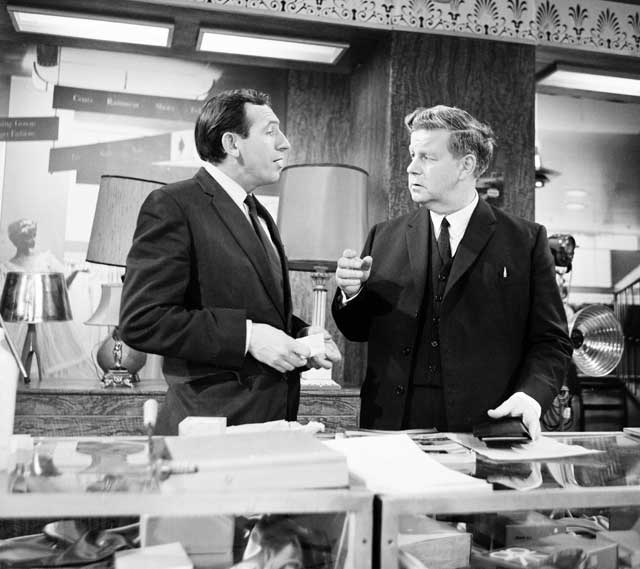Richard Pearson: Actor who relished showing the vulnerability of solid, respectable characters

To recent generations of television viewers, Richard Pearson was the voice of Mole in Cosgrove Hall's animated productions of The Wind in the Willows. His calm tones, along with those of Ian Carmichael (later Peter Sallis), David Jason and Michael Hordern for the similarly sympathetic characters of Rat, Toad and Badger, combined with the unhurried storylines, stop-motion animation and painstakingly created sets to give a sense of nostalgia for that Edwardian era of Kenneth Grahame's original novel. The 1983 television film was followed by four series of The Wind in the Willows (1984-88), as well as the spin-off Oh! Mr Toad! (1989 television film and 1990 series), all featuring Grahame's humanistic animal characters.
But Pearson was already a veteran actor on stage and screen, often taking middle-class, "respectable" roles as detectives, MPs, vicars and doctors – and was adept at showing the vulnerability of such apparently "solid" characters. He was also at home in Dickens adaptations. On stage, he was unfortunate enough to be involved in one of the theatre's great disasters, when he played the piano-playing boarding-house lodger Stanley in the original production of Harold Pinter's The Birthday Party (Lyric, Hammersmith, 1958), which closed after eight West End performances and received a critical mauling that could have ended the playwright's career.
"It wasn't just the play," Pearson told The Independent in 1994. "We all got panned. The houses were dreadful, and we had to fill the place with free seats for drama students." However The Birthday Party came to be regarded as a classic and the actor reprised his lead role in a 1960 Play of the Week production of it on ITV.
Born in Monmouth in 1918, Pearson was educated at Aymestrey Court School, Worcester, and Monmouth School. He made his professional acting debut, aged 18, as Dallis in The Ruined Lady, at the Collins Music Hall, London (1937), before joining a repertory company in Westcliff-on-Sea (1937-38). His ascent to the West End was fast; he played Unwin in Private History (Gate Theatre, 1938), but war intervened and his Army service in the 52nd Lowland Division saw him rise to the rank of lieutenant colonel.
Pearson returned to the stage after the Second World War, taking roles such as Simon in Family Portrait (Strand Theatre, 1948), John in Symphony in Violence (Embassy Theatre, 1948), Mac in The Philadelphia Story (Duchess Theatre, 1949) and Collins in The Iron Duchess (Cambridge Theatre, 1957). Later appearances in his long West End career included the jealous husband Charles Sidley in The Public Eye (Globe Theatre, 1962, opposite Maggie Smith), William Cecil in Vivat! Vivat Regina! (Piccadilly Theatre, 1970) and, again with Smith, as the solicitor Mr Bardolph in Lettice and Lovage (Gielgud Theatre, 1987) and the Reverend Canon Chasuble in The Importance of Being Earnest (Aldwych Theatre, 1993).
Three of Pearson's first film roles, in the 1950 pictures The Girl is Mine, The Woman in Question and The Clouded Yellow, were all as police officers. Among the several dozen other parts he played in the cinema were Mr Tupper in Scrooge (1951), an accountant in Charlie Bubbles (1967), the Vicar of Marlott in Tess (1979), Doctor Haydock in the Agatha Christie mystery The Mirror Crack'd (1980) and the defence secretary in the black comedy Whoops Apocalypse (1988).
On television, Pearson acted Detective Sergeant West in the 1960 police series The Days of Vengeance, but it failed to catapult him to starring roles. Instead, he was a prolific small-screen character for half a century, jumping from one programme to another.
He had longer runs as Inspector Bucket in Bleak House (1959), the Reverend Crisparkle in The Mystery of Edwin Drood (1960), Pecksniff in Martin Chuzzlewit (1964, one of his personal favourite roles), Mr Bulstrode in Middlemarch (1968), Robert Harley in The First Churchills (1969) and Dr Piggott, father of Zoe Wanamaker's high-flying PR executive switching to a job with a charity, in half-a-dozen episodes of Love Hurts (1992-94).
In sitcoms, Pearson was a regular as the theatrical agent Malcolm Parkes in Freddie and Max (1990), Dick Clement and Ian La Frenais' story of a fading Hollywood prima donna hiring a cockney researcher to work on her autobiography, and starred as Harry King, who befriends George Cole's widower, in My Good Friend (1995-96).
He also popped up as the fathers of Laura (Judi Dench) in A Fine Romance (1983-84, 1989) and Gary (Martin Clunes) in Men Behaving Badly (1995), and the restrained but absent-minded brother of Victor Meldrew (Richard Wilson) in One Foot in the Grave (1992).
Anthony Hayward
Richard de Pearsall Pearson, actor: born Monmouth 1 August 1918; married 1949 Patricia Dickson (two sons); died 2 August 2011.
Join our commenting forum
Join thought-provoking conversations, follow other Independent readers and see their replies
Comments
Bookmark popover
Removed from bookmarks